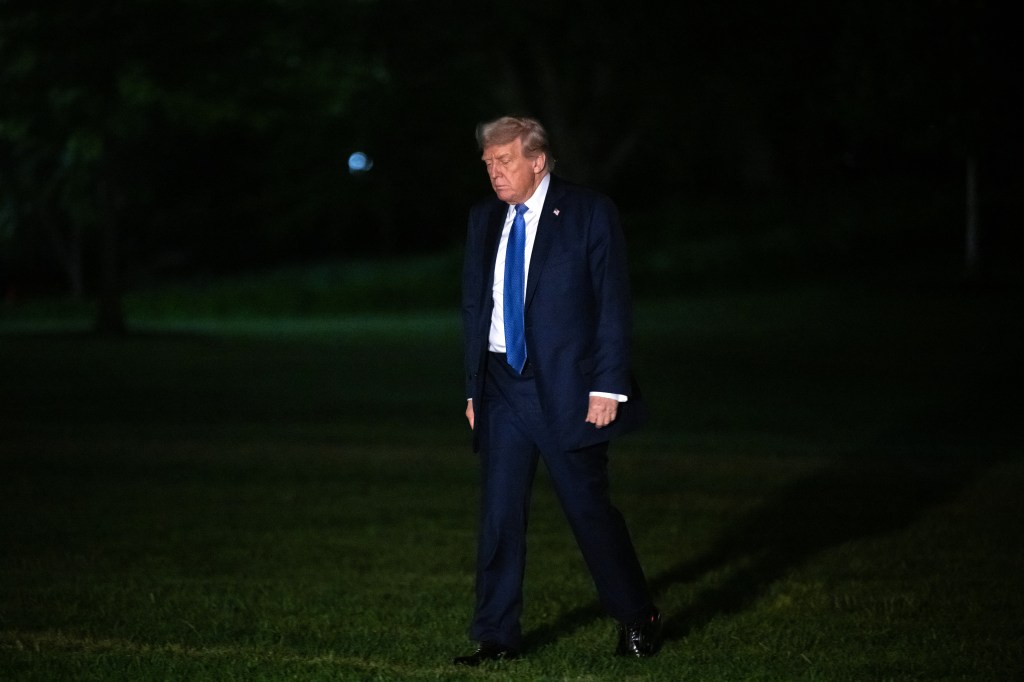
Nearly 100 days into his second term as president, things are clearly not going great for Donald Trump.
His administration’s first major domestic undertaking, the dubious plan to cut government waste through the Department of Government Efficiency, appears to be rapidly losing support after months of goal-post moving and results embellishing. All the major stock market indices have declined significantly since the beginning of the year, largely due to Trump’s new tariff regime, which is already harming the economy in other ways. American allies feel spurned while American enemies appear emboldened. Even the most successful part of the Trump administration’s agenda, increasing border and immigration enforcement, has become mired in legal challenges thanks to some high-profile cases that suggest, at best, administrative carelessness and, at worst, defiance of the law.
Perhaps not surprisingly, after beginning this term with higher approval numbers than he ever received during his first White House stint, Trump has been steadily declining in the polls, including two new surveys released this week.
But the president himself seems to believe that his second term is unfolding exactly as planned. “I feel that we’ve had a very successful presidency in 100 days,” Trump told Time magazine in a recent interview. To journalists at another magazine, The Atlantic, the president recently expressed joy about his job. “I’m having a lot of fun, considering what I do,” Trump said. This appears to be more than the typical over-the-top blustering the 78-year-old commander in chief has become known for; indeed, he genuinely seems not to understand what all the fuss is about.
“I think that what I’m doing is exactly what I’ve campaigned on,” Trump told Time, hitting a theme he returned to several times over the course of that interview, particularly when pressed about his expansion of executive power to achieve his preferred policies. “Just remember, every single question you’re asking, I campaigned on it. I campaigned on all the things you’re talking about, all the things you’re asking about, and openly campaigned. And we’re given credit, even by radical left lunatics. We are given credit for that.”
In one sense, Trump is right. From instituting massive tariffs to cracking down on immigration to pardoning January 6 rioters to seeking revenge against his political enemies, he made his intentions abundantly clear on the campaign trail. Voters cannot accuse him of obfuscating his agenda; a majority simply decided that returning Trump to the Oval Office was preferable to giving the Democratic Party another four years in charge. Americans bought their tickets; they knew what they were getting into.
But despite his claim that he’s doing exactly what it says on the tin, most Americans are not on board with Trump’s version of the administrative chaos and economic adventurism that voters rejected under Joe Biden. The numbers from the latest Washington Post-ABC News survey lay out the president’s predicament, finding Trump’s approval is now underwater on all major issues: the economy (39 percent approval to 61 percent disapproval); immigration (46 percent to 53 percent); “managing the federal government” (42 percent to 57 percent); relations with other countries (38 percent to 61 percent); tariffs (34 percent to 64 percent); and the stock market volatility (31 percent to 67 percent). Overall, the Post-ABC poll found just 39 percent approve of Trump’s job and 55 percent disapprove. A new CNN poll reached similar conclusions for both his overall approval and on specific issues.
These polls refute the notion that Trump is simply doing what voters elected him to do. Did 49.8 percent of the American voting public cast their ballots for Trump because they wanted him to defy court orders? To allow incompetence at the highest levels of the national security apparatus? To use the power of the federal government to target major law firms, elite universities, and mainstream media outlets? To institute an indiscriminate dragnet for illegal immigrants built on dubious legal grounds that has already resulted in people being improperly deported from the country? To make unilateral and contradictory decisions about trade policy based on Trump’s fundamental misunderstanding of trade deficits?
Among the many benefits of a democratic and republican system like ours is that information is freely available, public opinion can be readily discerned, and leaders must be responsive to the signals or face the political consequences. These latest poll numbers are a dismal reflection on Trump’s first 100 days, and while he is not up for reelection (despite teasing the idea of running for a constitutionally prohibited third term), they don’t portend good things for his Republican Party as it tries to hang on to power on Capitol Hill in next year’s midterm elections.
That said, don’t expect a course correction from Republicans in Congress—or the White House—anytime soon. Although some scary movement in the bond markets earlier this month spooked Trump into backing off on implementing some of the tariffs he had announced, the president has since claimed he wasn’t worried and will continue to embrace these types of trade actions. When asked by The Atlantic if catastrophic economic conditions could make him change his trade policy, Trump responded, “I don’t see how I could possibly change.” Stamp that phrase on a t-shirt.
There’s also no incentive for Trump’s sycophants in MAGAworld or in Congress to encourage him to recalibrate, given the president’s monopolistic power over political capital within the Grand Old Party. Internally, true believers like Stephen Miller and Russ Vought have never had more license to remake the executive. The way things are going, this administration could be their last chance at complete political power for the near future.
“Damn the torpedoes, flank speed ahead,” said Steve Bannon, Trump’s one-time White House aide and MAGA whisperer, when I asked over text message if he senses the president recognizes the precarious political position he’s in. “The next 100 days [are] even more important/historic than the first 100.”

















